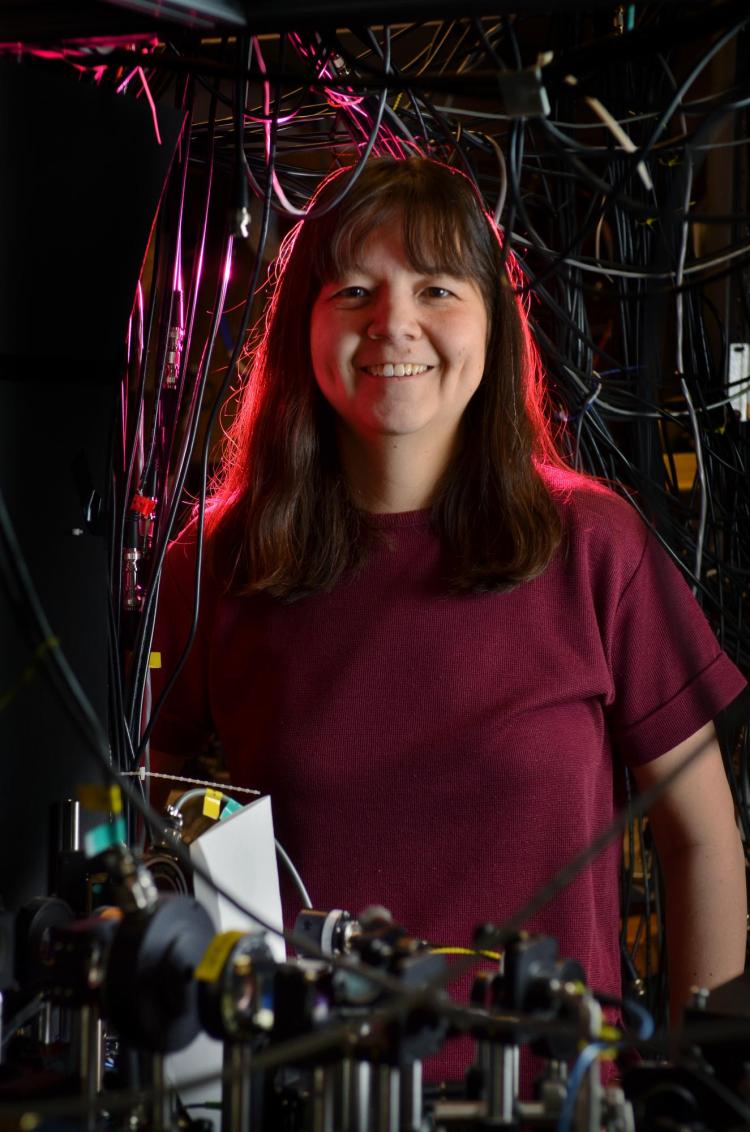Honoring a visionary, lost too soon
New endowed fund will support physics fellowships in honor of the late Deborah Jin
In 2001, Carl Wieman and Eric Cornell became the second and third — of five, to date — faculty members at the University of Colorado Boulder to receive the Nobel Prize, for their work in creating a Bose-Einstein condensate.

Deborah Jin in her laboratory and (above) during a CU Wizards presentation. Photos by Glenn Asakawa and Casey A. Cass.
Until she died of cancer at the tragically young age of 47 in 2016, many Nobel handicappers had put their money on Deborah Jin to become CU Boulder’s next laureate, thanks to her groundbreaking work in creating a fermionic condensate — a feat even more challenging than creating the Bose-Einstein condensate.
“A lot, lot harder,” Wieman answered a reporter from the New York Times when asked to compare Jin’s achievement to his Nobel-recognized work. “What did come out was more impressive than I thought would be possible.”
“There’s that classic saying that dancer Ginger Rogers did everything Fred Astaire did, but backwards, and in heels,” says Patricia Rankin, professor of physics at CU Boulder. “That’s what Debbie did with the fermionic condensate.”
Jin’s “visionary and methodical approach made it possible to use these ultracold gases as model systems to tease out the quantum principles that lead to behaviors in real materials, such as superconductivity,”according to the journal Nature.
But Jin, professor of physics and fellow of JILA — a joint institute between the university and the National Institute for Science and Technology — didn’t just hide away in the lab. She had a rich family life, raising a daughter with her husband, JILA physicist John Bohn. She cared for and challenged her students, both in and out of the classroom, and was known as a tireless mentor and champion of women in science.
To honor her legacy, the CU Boulder College of Arts & Sciences has created the Deborah Jin Endowed Graduate Fellowships Fund, which will fully support the work and mentorship of two graduate scholars in physics each semester, starting in 2020.
The initial goal is to raise $1 million for this endowment. With gifts from the Heising Simons Foundation, the Chancellor’s Office and JILA, the physics department has raised $700,000. Wieman and his wife, Sarah Gilbert, would like to bring this to $800,000. They have pledged another $50,000 as a challenge to encourage others to contribute.
Debbie Jin embodied the highest ideals in physical science, and we hope to support and inspire others who might emulate her.”
—James W.C. White, interim dean
To date, faculty and other supporters have donated more than $26,000 toward Wieman’s and Gilbert’s $50,000 matching gift, according to CU Boulder’s Office of Advancement.
“This endowment honors a consummate, exemplary scientist whom we lost too soon,” says James W.C. White, interim dean of the College of Arts and Sciences. “Debbie Jin embodied the highest ideals in physical science, and we hope to support and inspire others who might emulate her.”
In addition, the college will provide annual support as needed to ensure that the fellowships will fully cover awardees’ tuition costs for an entire semester.
Awardees will be chosen based on their graduate-school application materials, except for scores on the GRE (Graduate Record Examination), which are “known to disadvantage applicants from under-represented groups,” according to White.
Preference will be given to applicants “who represent the spirit of Deborah Jin and have demonstrated a commitment to … serving their community and/or family and … breaking barriers for underserved or underrepresented populations in the larger Physics community.”
“We want to honor Debbie Jin’s legacy as one of the pioneering women physicists of her time by bringing people into physics with the promise to follow in her footsteps,” Rankin says. “We have a really good physics department, and by paying attention to the need to broaden participation and perspectives, we will help direct the future of the field.”
US News & World Report ranks CU Boulder’s Physics Department as 14th best in the world, including second-best in atomic/molecular/optical physics and sixth in quantum physics. The international Shanghai Ranking Consultancy ranks the department as the world’s 12th best.

